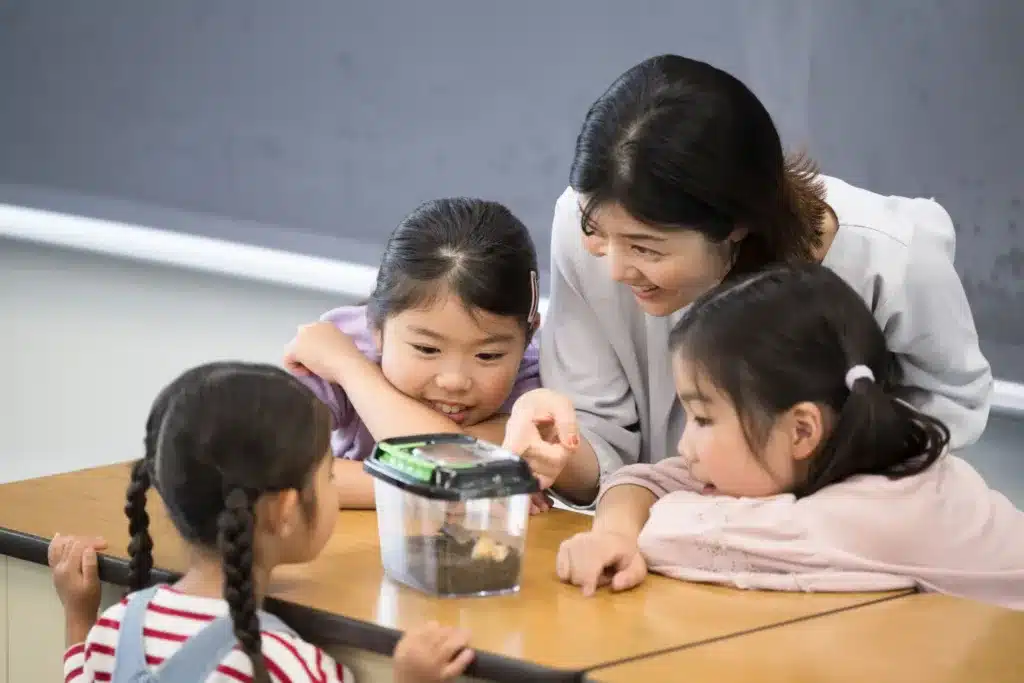Key Changes: Understanding the Updated P4 Science Syllabus
- 20 September 2025

In 2023, the Ministry of Education (MOE) introduced a significant update to the Primary School Science syllabus, a change that will impact students preparing for their Primary School Leaving Examination (PSLE) in 2026. This update, which aims to make Science more accessible and engaging, is designed not just to modernise the content but to enhance the way Science is taught across schools. And naturally, for parents, it’s important to grasp what these changes entail and how they will help our children develop a stronger foundation in Science.
A Fresh Look at P3, P4, P5 & P6 Science
Since its last revision in 2014, the Primary School Science syllabus has been structured around five core themes—Diversity, Cycles, Interactions, Systems, and Energy.
These themes were designed to connect students with everyday experiences and natural phenomena, enhancing their understanding of the world around them. They provide a comprehensive foundation in both life and physical Sciences, preparing students for more advanced studies and everyday problem-solving.
The 2023 update, however, aims to standardise content delivery and ensure a consistent learning experience across all schools*.
By aligning the teaching approach nationwide, the MOE aims to ensure that every student, regardless of school, receives the same quality of education in Science. This update also reinforces the Science Curriculum Framework’s goal: to build a robust foundation that supports students academically, socially, and in their future careers.
*It’s important to note that while the syllabus provides a structured framework, individual schools still have the flexibility to tailor the topics according to the insights and recommendations of their teachers.
What’s Different? Key Changes in the Syllabus
So, what can parents and students expect from the refreshed Primary 4 (P4) Science syllabus?
1. Level-Specific Learning
The shift from a combined Lower Block for Primary 3 and 4 to a distinct syllabus for each year marks a significant change in how Science might be taught in Primary Schools. Previously, the flexibility within the Lower Block allowed schools to tailor the sequence of topics, adjusting the curriculum as deemed necessary. This could lead to varied learning experiences across different institutions.
With the updated syllabus, P4 students will engage with a syllabus crafted specifically for their academic level. As mentioned, this change aims to standardise what is taught across all schools in the hopes that every P4 student encounters the same Scientific concepts at the same time. This standardisation is also expected to smooth out discrepancies in Scientific understanding, fostering a more consistent educational experience and solidifying a uniform foundation of key Scientific principles for all students.
However, while the syllabus has become more structured, schools still have some level of flexibility to customise their teaching methods. This allows topics to be taught in varied ways, fostering creativity in classrooms. Additionally, as Primary School students do not face nationwide exams until the PSLE in Primary 6, schools can tailor topic delivery to meet their students’ specific needs.
2. Consistent Core Themes
As a result of the above-mentioned standardisation, the recent overhaul of the P4 Science syllabus also brings a significant shift towards standardisation of core themes and topics. This consistent approach guarantees that all students explore the same Scientific concepts at the same pace, fostering a more equitable educational landscape.
The key shifts in themes and core topics are as follows:
| Content | [OLD 2014 SYLLABUS] Lower Block (Primary 3 and 4) | [NEW 2023 SYLLABUS] Primary 4 |
|---|---|---|
| Themes |
|
|
| Topics |
|
|
3. Crystal Clear Learning Outcomes
The revised P4 Science syllabus also includes a meticulous refinement of learning outcomes (LOs), ensuring they are detailed and directive.
The updated LOs now incorporate precise keywords and phrases, enhancing both teaching clarity and student understanding, sharpening students’ focus on essential concepts while providing explicit guidance on how to apply these ideas practically.
For example, the topic of light has been elaborated upon to not only cover the formation of shadows but also to introduce the fundamental principle that “light travels in straight lines.” This is a shift from the previous LOs, which were broader and less directed.
| Old LO | New LO |
|---|---|
| Students should understand that shadows are formed when light is blocked by an object. | Students must recognise that light travels in straight lines and that shadows occur when this light is obstructed, either fully or partially. |
4. Skills Take Centre Stage
In the revamped P4 Science syllabus, a significant emphasis has also been placed on nurturing a wide array of skills crucial for Scientific inquiry and real-world applications.
The new syllabus now includes a detailed glossary that outlines the key skills necessary for today’s Science students. Some of the new terms listed in the Glossary of Terms include:
- Analyse: To deconstruct objects, information, or processes into their constituent parts and analyse the interrelationships and patterns among them.
- Evaluate: To evaluate the validity, precision, and overall quality of information, processes, or ideas.
- Formulate Hypothesis: To provide a comprehensive explanation that encompasses a series of related observations or events. This process builds upon the act of inferring.
- Make Decisions: It involves establishing and utilising a set of criteria to effectively choose among options that appear equally viable. This process of establishing criteria necessitates careful consideration of potential consequences and relevant values.
- Use Apparatus and Equipment: Develop a comprehensive understanding of various apparatuses, including their functions and limitations, and acquire the skills to select and utilise them effectively for diverse tasks.
The latest content in the P4 Science textbooks also puts a spotlight on these skills. For instance, topics like Matter and Energy now include activities that require students to take precise measurements, design and conduct experiments, and interpret data from graphs.
Diving Deeper: Key Topics in the New P4 Science Syllabus
1. Systems: Plant and Human Systems
The updated P4 Science syllabus brings an in-depth exploration of both plant and human systems. Students will discover the integral parts of plants—leaves, stems, roots, and flowers—and their specific functions. Similarly, the human digestive system is studied in detail, teaching students about the journey of food through the body. This comprehensive approach enhances their understanding of biological systems but also fosters critical thinking about how various components within a system interact and contribute to its overall functionality.
2. Cycles: Matter and Water
The curriculum extends into the continuous cycles of matter and water, which is crucial for understanding environmental Science. Students will examine how matter transitions between solid, liquid, and gas states through processes such as evaporation and condensation. The study of the water cycle, including evaporation, condensation, and precipitation, connects classroom learning with everyday natural phenomena, reinforcing the relevance of scientific study to real-world contexts.
3. Energy: Forms and Uses of Light and Heat
Focusing on energy, the syllabus emphasises the critical roles of light and heat. Young learners will explore how light is essential for vision and how heat energy is transferred between objects, impacting our daily lives. This segment aims to lay a strong foundation for future Scientific inquiries, highlighting the practical applications of energy in various forms and preparing students for more complex Scientific concepts in subsequent years.
Preparing for Success: Tips for Parents

Now, as parents, what can you do to help your child excel in the newly updated P4 Science syllabus?
Nurturing a Love for Science
- Connect to Everyday Life: Integrate Science into daily activities, showing how Scientific concepts apply to things your child sees and does regularly. This approach helps demystify Science, making it more accessible and relatable.
- Explore Science Centres: Enhance learning by visiting Science museums or centres. These trips can ignite a child’s curiosity and enthusiasm for Science through interactive exhibits and real-world applications.
- Spark Curiosity with Questions: Foster a questioning mindset by encouraging your child to ask and explore answers to “how” and “why” questions about natural phenomena.
- Develop Observation Skills: Encourage your child to be observant in their environment. This practice is crucial for Scientific inquiry as it helps them notice details and patterns that are key to forming scientific understandings.
Supporting Learning at Home
- Provide a Conducive Learning Environment: Create a study space that is quiet, well-lit, and stocked with the necessary resources to explore Science topics in depth.
- Encourage Active Reading and Note-Taking: Support your child in developing strong study habits through active engagement with their Science textbook and other educational materials.
- Help Your Child Practice: Regularly review and apply concepts from the syllabus, using practice questions to reinforce learning and build confidence.
- Stay Informed: Keep up-to-date with the syllabus and any changes or recommendations from your child’s school, ensuring you are equipped to support their learning journey effectively.
Securing a Strong Foundation in Science
Transitioning through various educational stages and navigating the various syllabus changes can be daunting for both children and parents. With the revised P4 Science syllabus, it’s natural to wonder, “How can I prepare my child effectively for these changes?” and ace their PSLE?
At TLS Tutorials, we’re committed to supporting this journey. Our programmes are meticulously designed to align with the latest syllabus, focusing on building a robust foundation in Science. Through custom-tailored lessons that emphasise hands-on experiments and critical thinking, we prepare students not just for exams but their transition from Lower to Upper Primary School.
Enrol your child in our Science tuition for Primary 4 students to boost their confidence and mastery of the subject. Contact us today to learn how our Primary School Science tuition programme helps your child excel in their Science education and beyond.
